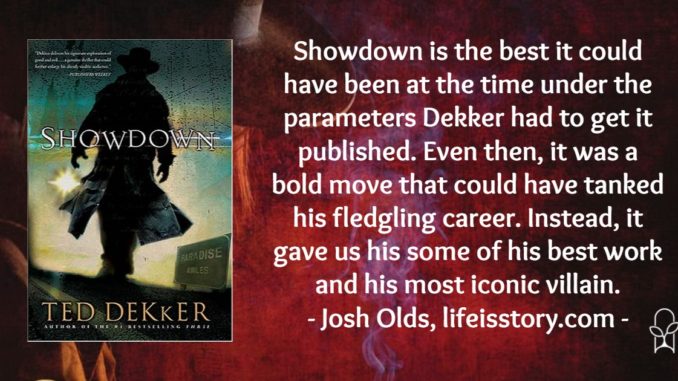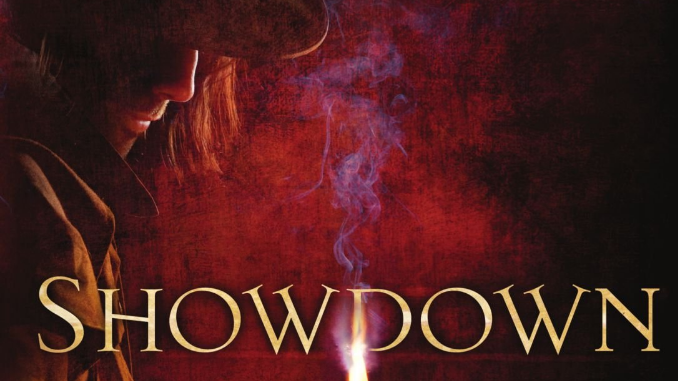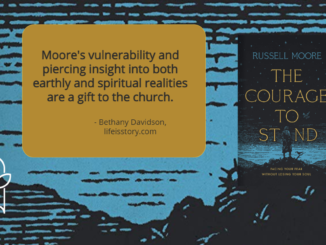
Also by this author: The Promise, The Drummer Boy, Sinner, Green, The Dream Traveler's Quest, Into the Book of Light, The Curse of Shadownman, The Garden and the Serpent, The Final Judgment, Millie Maven and the Bronze Medallion
Series: The Paradise Trilogy #1
Published by Thomas Nelson on January 2006
Genres: Fiction, Christian, Suspense
Buy on Amazon
Goodreads

When a stranger named Marsuvees Black appears in Paradise, he brings with him a message of hope and love. Or is it death and hate? Perhaps neither - perhaps both. He seems to know too much about the town's many unspoken secrets, and he himself holds the greatest secret of them all. As black clouds and sandstorms envelop the town, it becomes almost impossible to get in or out. It quickly becomes apparent that Paradise is being isolated for a reason. But why?
Wanna trip, baby?
Following the breakout success of The Circle Trilogy, Dekker returned to a book he’d had rejected multiple times, cleaned it up, and pitched it to Thomas Nelson as the first book in a new trilogy—one that also had connections to the world of the Circle. Only one problem: While Dekker’s previous work had either stayed entirely within the accepted boundaries of “Christian Fiction” (see The Caleb Books) or toed the boundary line but in a way that had a safe precedent (see When Heaven Weeps), this new novel was speculative fiction with a dark twist. It was King or Koontz, not something you’d see in the Christian market.
Originally called Storytellers, this novel—ultimately called Showdown—riffed off of the words in the book of John about “the word made flesh.” This connection to a piece of Scripture is thematically similar to a lot of early Dekker novels (see Thr3e and Obsessed). The novel follows a group of children separated from the world and raised in a monastery to test the purity of their faith. (And if this plotline seems familiar, it’s because Dekker uses it in Blessed Child.) Specifically, the children have been raised in the monastery in Paradise so that they would have a pure enough faith to write in blank books that make whatever is written in them come true.
Readers who have read The Circle Trilogy will understand that these are the famed Books of History that disappeared from Other Earth in White. I mention all of these connections to show how the theme of Showdown was present in all of Dekker’s earlier work. He may not have been able to get Showdown published at the time, but it didn’t stop him from exploring those themes in his writing. With the success of The Circle Trilogy, Dekker finally had the opportunity to tell the story the way he really wanted—and the mega-series The Books of History Chronicles was born.
Showdown is about the sleepy town of Paradise, Colorado. The residents are unaware that a secret monastery lies in the mountains outside of town; even more unaware that there’s an experiment going on that could change the world. David Abraham, Project Showdown’s founder, has gathered special children from all over the world and raised them in this monastery for the sole purpose of being able to correct the world’s wrongs by writing in the books that create truth. Only one problem: Marsuvees Black.
Things begin to unravel in Paradise, Colorado, when the polyester-clad Black strolls into town like a charismatic urban cowboy preacher. With his theatrics—and a bit of hallucinogenic worm sludge—he has the town eating out of his hand, offering them a salvation that comes through letting their depraved passions run free. Dekker lets the story play out with all the bizarreness and unpredictability he can muster. Being restrained by the boundaries of Christian Fiction actually makes the actions of Paradise’s residents that much weirder, as Dekker searches to convey the story’s symbolism of sin without going full Stephen King.
Meanwhile, the monastery is coming apart at the seams as well. The children have, to this point, been unaware of the blank books. And when—led by Black—thirteen-year-old Billy discovers them, he leads a fair number of the students into the dungeons to write a story about the desecration of Paradise. His actions, along with the nature of the monastery, present more of a threat than almost anyone at the monastery actually knows.
Showdown is a fast-paced thriller with layers of symbolism heaped into a redemptive story. At times, the symbolism outweighs the plot’s realism, meaning that Dekker’s story, while obviously supernatural, doesn’t always seem believable even within the story. He recreates the fall of humanity into sin through Billy’s temptation by Black into the dungeons. The desecration of Paradise is played out through the stories written in the blank books that affect the town of Paradise in the valley below. While wildly different in tone and genre, Showdown is every bit the retelling of redemptive history that the Circle Trilogy is. Even today, some fifteen years after I first read Showdown and having read it a dozen times since, I still find new nuances and layers to Dekker’s theme.
Marsuvees Black may be the villain of the story, but in 2005 when Dekker brought Showdown to the Christian Fiction market, he was offering to them a Gospel that made them cringe just a bit. Little bit of Grace and Hope, little bit of shaking up the Christian Bookseller’s Association, little bit of portraying evil as truly evil and painting it with dark and black brushstrokes. Dekker, was, in essence, asking CBA publishers and readers if they too wanted to trip.
Showdown was darker and weirder than Christian Fiction got at the time and when it was first released, one review called it “long on fiction and short on Christianity” while another called it “not at all for Christians.” This mirrored some of the criticism Dekker received from publishers when shopping it around. It was “too much like Stephen King and not enough like Beverly Lewis or something like that,” Dekker writes in prologue of The Paradise Trilogy omnibus edition. But the book becomes its own apologist in the first forty pages. Through the voice of his characters, Dekker writes:
“How dare a child of God look away from the pain of evil—doing so undermines the grace that conquers evil. Of course we don’t sin for the sake of grace, but neither do we sweep evil under a rug and pretend it doesn’t exist” (p. 38).
Showdown accomplishes that masterfully. True, I would’ve liked to have seen more depth in characterization of Paradise’s residents. True, Dekker has to really work hard to contrive the story’s setup and how the books came to Paradise. And, true, as the Books of History Chronicles spread, not all the tendrils would connect quite so well. But these things are minor. Showdown is the best book it could have been at the time under the parameters Dekker had to get it published. Even then, it was a bold move that could have tanked his fledgling career. Instead, it gave us his some of his best work and his most iconic villain.





Be the first to comment